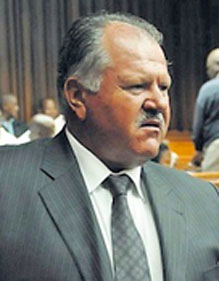
I would like to understand more about plea bargaining, which doesn't seem to serve justice. Former police commissioner Jackie Selebi was corrupted by Glenn Agliotti, who then got off in exchange for ratting on Selebi. Why is it so difficult to get sufficient evidence of a conspiracy without an informant, and why was the commissioner a bigger fish than the mobster?
Yours
In The Dark
Dear In The Dark,
The essence of plea bargaining is to use smaller fish to secure convictions against bigger fish, or to offer the accused a reduced sentence in return for pleading guilty. It is a practical approach to criminal prosecution provided for in the Criminal Procedure Act.
Remember, the onus is on the state to prove the accused's guilt beyond a reasonable doubt. If it fails to do so, it loses the case. It needs evidence and sometimes the only way to obtain this is by way of a witness who enters into a plea bargain agreement – in exchange for a reduced sentence, the accused will testify against his co-conspirators. It is particularly useful when a criminal conspiracy lacks hard evidence. Also, remember that it is not the case that state witnesses under plea bargain agreements necessarily "get off". The plea bargain deal may be for a reduced sentence only and not freedom.
Another reason it makes sense is because of the enormous cost-saving it entails. Criminal trials are lengthy and costly and paid for by taxpayers. It makes sense to shorten the proceedings and offer the criminal turned state witness a reduced sentence to improve the state's chances of putting away the big guy.
Your feeling that it does not serve justice is understandable. Why should any criminal get off or secure a reduced sentence after having pleaded guilty to committing a crime? Plea-bargaining is a policy decision based on the practical realities of the criminal justice system – an imperfect system at the best of times. In a sense, it is the lesser of two evils. And perhaps sometimes a greater justice is served when, as a result of the evidence of a smaller fish, the real shark is convicted.
You raise the issue of who in fact was the "shark” – was it convicted drug dealer Glenn Agliotti, or was it former national police commissioner Jackie Selebi? It is difficult to speculate about the state's thinking on this, but perhaps it decided that mobsters come and go but a corrupt commissioner posed a bigger threat. He was, after all, operating with the full might of the government and with considerable state resources at his disposal. In addition to this, Selebi sat inside the criminal justice system and therefore could manipulate and corrupt it to serve his own ends.
Another important point is that it would be impossible for organised crime to operate on the scale and with the ease that it does without the collusion of high-ranking police officers. This makes it all the more important that these officers are brought to book. Plea-bargaining is one way in which to do this, by getting gangsters with knowledge of police involvement to testify against police officers.
Sadly, a prosecution is only as good as the evidence provided by the police and, as we know, our police investigations are often woefully inadequate. That is why we should probably make more, rather than less, use of plea-bargaining.
Plea-bargaining is also well suited for less serious crimes. Our prisons are full of petty criminals who cannot afford bail, and it can clear the backlog in the system, creating space and freeing up resources to go after the really bad guys.
Plea-bargaining is an imperfect answer to an imperfect system, but sometimes it is all we have.
• This article was first published in Sunday Times: Business Times

